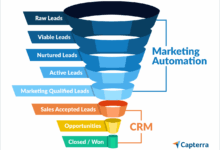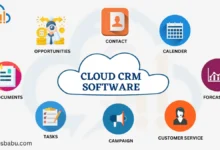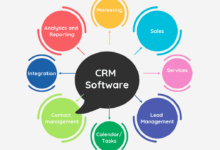Affordable CRM Software for Startups
Affordable CRM Software for Startups: Navigating the landscape of customer relationship management (CRM) can be daunting for burgeoning businesses. Finding a solution that balances cost-effectiveness with essential features is crucial for startups striving for sustainable growth. This exploration delves into the key considerations for selecting affordable yet powerful CRM software, examining pricing models, essential features, implementation ease, scalability, and the importance of robust customer support and data security. Understanding these aspects empowers startups to make informed decisions and leverage CRM technology to its fullest potential, driving efficiency and fostering stronger customer relationships.
The initial investment in CRM software is just one piece of the puzzle. Hidden costs, such as implementation time, training, and potential integration complexities, should be carefully factored into the budget. This analysis helps startups weigh the long-term value proposition against the upfront cost, ensuring a solution that aligns with their current resources and future growth trajectory. We’ll explore various pricing tiers, highlight essential versus desirable features, and provide practical advice for seamless integration with existing business tools.
Defining “Affordable” for Startups
Defining “affordable” CRM software for startups is subjective and depends heavily on the specific needs and financial capacity of the business. There’s no single magic number; instead, affordability is determined by a careful assessment of various factors, including the startup’s size, revenue, and long-term goals.
Pricing tiers considered affordable vary greatly. A micro-startup with a few employees and low revenue might find a solution costing under $50 per month perfectly reasonable, while a rapidly growing startup with significant funding might comfortably afford a $500+ per month enterprise-level plan. The key is finding a balance between features, functionality, and cost that aligns with the company’s current and projected needs.
Pricing Tiers and Startup Size/Revenue
Startups should consider their stage of growth when evaluating CRM pricing. Early-stage startups with limited budgets might opt for entry-level plans offering basic contact management and sales tracking features. As they grow and revenue increases, they can transition to mid-tier plans with more advanced features like marketing automation and reporting capabilities. Established startups with substantial revenue may require enterprise-level plans with extensive customization options and robust integrations. For example, a bootstrapped startup with under $100,000 in annual revenue might find a $25-$75 per month plan suitable. A startup with $500,000 – $1M in annual revenue could comfortably invest in a $200-$500 per month plan, while a rapidly scaling startup exceeding $1M in annual revenue might justify a $1000+ per month investment. These are broad estimates; actual costs will vary depending on the specific vendor and features.
Factors Influencing Perceived Value of CRM Pricing
The perceived value of CRM software pricing extends beyond the sticker price. Several factors influence a startup’s willingness to pay. These include the software’s ease of use, its integration with other business tools, the level of customer support provided, and the overall return on investment (ROI) expected from improved sales and marketing efficiency. A highly intuitive CRM with excellent customer service might be perceived as more valuable, even at a higher price point, than a less user-friendly option with limited support. Similarly, a CRM that seamlessly integrates with existing marketing and sales tools can significantly increase efficiency, justifying a higher cost.
Hidden Costs of CRM Implementation
Beyond the initial software purchase price, startups should account for various hidden costs associated with CRM implementation. These can include the time and resources required for data migration, user training, customization, and ongoing maintenance. Integration with other software systems can also add complexity and cost. For example, migrating existing customer data from spreadsheets or legacy systems can be time-consuming and require specialized expertise. Training employees on how to effectively use the CRM system is crucial for maximizing its value, but this requires dedicated time and potentially external training resources. Customizations to tailor the CRM to the startup’s specific needs can add significant costs, depending on the complexity of the changes required. Finally, ongoing maintenance, including software updates, bug fixes, and technical support, represents an ongoing expense that should be factored into the total cost of ownership.
Key Features for Startup CRM Software
Choosing the right CRM is crucial for a startup’s growth. Early-stage businesses need software that’s both affordable and effective, focusing on core functionalities that drive sales and customer relationships. Overly complex or expensive CRMs can be a burden, diverting resources from essential business operations. Therefore, a strategic selection of CRM features is paramount.
Early-stage startups need to prioritize features that directly impact their core business functions. This differs from established companies with more complex needs. A lean, focused approach is key to maximizing ROI and avoiding unnecessary costs. Understanding the difference between “must-have” and “nice-to-have” features is essential for making an informed decision.
Must-Have vs. Nice-to-Have CRM Features for Startups
The following table outlines essential features for startups, categorizing them as either must-have or nice-to-have based on their immediate impact on business operations.
| Feature | Must-Have/Nice-to-Have | Rationale |
|---|---|---|
| Contact Management (with detailed contact information, notes, and activity history) | Must-Have | Essential for tracking interactions and building customer relationships. |
| Lead Management (lead scoring, lead assignment, and pipeline management) | Must-Have | Crucial for identifying and nurturing potential customers. |
| Sales Reporting and Analytics (basic sales performance metrics) | Must-Have | Provides data-driven insights for improving sales strategies. |
| Email Integration (sending and tracking emails within the CRM) | Must-Have | Streamlines communication and improves sales efficiency. |
| Task Management (scheduling and assigning tasks to team members) | Must-Have | Ensures accountability and keeps projects on track. |
| Customizable Fields and Workflows | Nice-to-Have | Allows for greater personalization and automation, but not critical in the early stages. |
| Marketing Automation (email campaigns, drip campaigns) | Nice-to-Have | Helpful for scaling outreach, but often requires more advanced features and may not be needed initially. |
| Advanced Reporting and Analytics (detailed sales forecasting, ROI analysis) | Nice-to-Have | Provides deeper insights but is less crucial than basic reporting in the initial phase. |
| Integration with other business tools (e.g., accounting software, email marketing platforms) | Nice-to-Have | Improves efficiency but can be added later as the business grows and integrates more tools. |
Comparison of Affordable CRM Options
The following table provides a brief overview of some popular affordable CRM options. Note that pricing and features can change, so it’s important to check the vendor’s website for the most up-to-date information. User reviews are summarized and reflect a general sentiment; individual experiences may vary.
| Feature | HubSpot CRM (Free Plan) | Zoho CRM (Free Plan) | Freshsales CRM (Free Plan) |
|---|---|---|---|
| Contact Management | Available | Available | Available |
| Lead Management | Available | Available | Available |
| Sales Reporting | Limited | Limited | Limited |
| Email Integration | Available | Available | Available |
| Pricing Tier | Free, Paid | Free, Paid | Free, Paid |
| Availability | Web, Mobile | Web, Mobile | Web, Mobile |
| User Reviews Summary | Generally positive, praised for ease of use and free features. Some limitations noted in reporting. | Positive reviews on flexibility and customization. Some users report a steeper learning curve. | Good reviews for its intuitive interface and robust features in the paid plans. Free plan is considered basic. |
Ease of Use and Implementation
For startups operating on tight budgets and timelines, choosing a CRM system that’s both affordable and easy to use is paramount. A complex system requiring extensive training and technical expertise can quickly become a burden, diverting valuable resources away from core business activities. Ease of implementation and user-friendliness are critical factors influencing a startup’s success with a CRM.
A user-friendly interface significantly reduces the learning curve for employees, allowing them to quickly adopt and effectively utilize the software. This translates to increased productivity and faster return on investment. Conversely, a difficult-to-navigate system can lead to frustration, decreased adoption rates, and ultimately, a failure to leverage the CRM’s full potential.
User-Friendly Design Elements in Affordable CRM Software
Intuitive design is key to user-friendly CRM software. Effective design incorporates several elements. Clear navigation menus, for example, allow users to quickly locate the information or tools they need. A consistent layout throughout the system ensures a predictable user experience, minimizing confusion and reducing the time needed to learn the software. Simple, straightforward dashboards that present key metrics in an easily digestible format are essential. Consider software that uses visual cues like icons and color-coding to highlight important information or guide users through different functionalities. Furthermore, the use of drag-and-drop features for tasks such as organizing contacts or scheduling activities can significantly enhance the user experience. Finally, readily available help documentation and online tutorials further contribute to ease of use.
Factors Contributing to Easy CRM Implementation for Startups
Implementing a new CRM system, even an affordable one, requires careful planning and execution. For startups with limited technical resources, choosing a cloud-based CRM is crucial. Cloud-based systems eliminate the need for complex server setups and IT infrastructure, simplifying the implementation process significantly. Furthermore, many affordable CRMs offer pre-built integrations with popular business tools such as email marketing platforms and accounting software. These integrations streamline workflows and reduce the need for manual data entry, saving time and effort. Another key factor is the availability of comprehensive onboarding and support resources. A good CRM provider will offer tutorials, documentation, and responsive customer support to assist with the implementation process and address any questions or issues that may arise. Finally, opting for a CRM with a flexible and customizable structure allows startups to adapt the system to their specific needs and workflows without requiring extensive technical knowledge. This avoids the complexities associated with custom development and configuration.
Integration Capabilities
A robust CRM system isn’t just a contact database; it’s the central hub of your startup’s operations. Its value is significantly amplified when integrated with other essential tools, creating a streamlined workflow and eliminating data silos. Effective integration minimizes manual data entry, improves data accuracy, and ultimately boosts efficiency and productivity.
Integrating your affordable CRM with other software solutions offers several key benefits. Connecting your CRM to marketing automation tools, for example, allows for automated lead nurturing and personalized campaigns based on customer interactions within the CRM. Similarly, integration with email marketing platforms enables targeted email campaigns and automated follow-ups, enhancing customer engagement. Finally, integrating with accounting software streamlines financial processes by automatically updating customer invoices and payments, improving financial visibility and reporting.
Common Integrations for Startups
Seamless data flow between different applications is crucial for a startup’s growth. Several common integrations significantly improve operational efficiency and data analysis. Choosing a CRM with readily available and easy-to-use integrations is paramount.
- Marketing Automation Platforms (e.g., HubSpot, Mailchimp): These integrations allow for automated lead scoring, personalized email sequences, and targeted advertising based on CRM data, optimizing marketing efforts and conversion rates. For example, a new lead entering the CRM could automatically trigger a welcome email sequence in Mailchimp.
- Email Marketing Platforms (e.g., Mailchimp, Constant Contact): This integration allows for segmenting email lists based on CRM data (e.g., customer demographics, purchase history), enabling more effective and targeted email marketing campaigns. This leads to higher open and click-through rates, improving ROI.
- Accounting Software (e.g., Xero, QuickBooks): Integrating with accounting software streamlines invoicing, payment processing, and financial reporting. Data on customer payments and invoices is automatically updated in both systems, minimizing manual data entry and reducing the risk of errors. This integration provides a single source of truth for financial data.
- E-commerce Platforms (e.g., Shopify, WooCommerce): Connecting your CRM to your e-commerce platform provides a complete view of customer interactions and purchase history. This enables personalized recommendations, targeted marketing, and improved customer service. For example, abandoned cart emails could be triggered automatically based on CRM data.
Integrating a Hypothetical CRM with Mailchimp
Let’s imagine our affordable CRM, “StartUpCRM,” needs to integrate with Mailchimp. StartUpCRM would likely offer an API (Application Programming Interface) or a pre-built integration app within its marketplace. The integration process generally involves:
1. Authentication: Within StartUpCRM’s settings, you would connect to your Mailchimp account using your API key or by authorizing access through Mailchimp’s OAuth system. This securely links the two platforms.
2. Data Mapping: You’d then map the relevant fields from StartUpCRM (e.g., customer name, email address, company) to the corresponding fields in Mailchimp (e.g., subscriber name, email address). This ensures data consistency across both platforms.
3. Testing: After mapping, a test is crucial to verify the data transfer. This involves sending a small batch of data from StartUpCRM to Mailchimp and verifying its accuracy in Mailchimp’s subscriber list.
4. Automation (Optional): Once the integration is working, you can set up automated actions. For example, when a new lead is added to StartUpCRM, it automatically subscribes them to a specific Mailchimp list, triggering a welcome email sequence.
Scalability and Future Growth
Choosing the right CRM for a startup isn’t just about managing current contacts; it’s about building a system that can adapt and scale as your business grows. A CRM that struggles to keep pace with your expansion will quickly become a bottleneck, hindering efficiency and potentially costing you valuable time and resources. Investing in a scalable solution from the outset is crucial for long-term success.
Scalability in CRM software refers to its ability to handle increasing amounts of data, users, and features without significant performance degradation or increased cost. As your startup expands, you’ll likely need to add more users, integrate more applications, and manage a larger volume of customer interactions. A scalable CRM gracefully handles this growth, ensuring your team maintains productivity and efficiency. Conversely, a non-scalable system might become slow, unreliable, or even require a complete system overhaul as your business expands. This disruption can be costly and time-consuming, potentially impacting your ability to maintain momentum.
Evaluating CRM Scalability
Evaluating the scalability of different affordable CRM options requires a careful assessment of several key factors. Consider the CRM’s architecture (cloud-based solutions generally offer better scalability than on-premise systems), its capacity for data storage and processing, and its ability to accommodate additional users and features without significant performance issues. Look for providers who offer transparent pricing models that clearly outline how costs scale with increased usage. Requesting case studies or testimonials from existing clients who have experienced significant growth while using the CRM can provide valuable insights into its real-world scalability. Finally, reviewing the vendor’s roadmap for future development and upgrades can help determine their commitment to supporting continued growth.
Scalability Options of Different CRM Solutions
| Scalability Options | Pricing Impact | Feature Limitations |
|---|---|---|
| Cloud-based CRM with pay-as-you-go pricing | Generally increases proportionally with usage (users, storage, features). Can be very predictable. | Few, if any, inherent limitations; features usually expand with pricing tiers. |
| Cloud-based CRM with tiered pricing | Increases in steps as you move to higher tiers, offering more features and capacity at each level. | Feature limitations are defined by the pricing tier. May require migrating to a higher tier as needs change. |
| On-premise CRM | Initial investment is significant. Ongoing costs include maintenance, upgrades, and potential hardware replacements as data volume increases. Scaling can be expensive and complex. | Significant limitations based on initial hardware and software configuration. Scaling requires significant upgrades and potential downtime. |
| Hybrid CRM | Combines the costs and limitations of both cloud and on-premise solutions. The complexity of management can increase proportionally with scale. | Limitations depend on the specific configuration. Can be complex to manage and scale effectively. |
Customer Support and Resources
For startups, choosing the right CRM is crucial, but equally important is the level of support offered by the provider. A reliable support system can significantly impact a startup’s ability to effectively utilize the CRM, leading to improved efficiency and faster growth. Downtime due to software issues or a lack of clear guidance can severely hinder productivity, especially in the early stages of a business. Therefore, understanding the support options available is paramount when making a purchasing decision.
Effective customer support is more than just a helpdesk; it’s a strategic partnership that empowers startups to maximize their CRM investment. It translates to faster problem resolution, improved user adoption, and ultimately, a higher return on investment. The quality of support offered can be a significant differentiator between CRM providers, influencing a startup’s overall experience and success. This section explores the diverse support options offered by various affordable CRM providers and identifies the key characteristics of excellent customer support for startup users.
Customer Support Options Comparison
Affordable CRM providers typically offer a range of support options, each catering to different needs and budgets. These often include email support, knowledge bases (FAQs and help articles), phone support, and live chat. Some providers may also offer premium support packages with dedicated account managers or faster response times for an additional fee. For example, HubSpot’s free CRM offers extensive documentation and a community forum, while their paid plans include email and phone support. Zoho CRM, another popular option, offers a comprehensive knowledge base, email support, and phone support across its various pricing tiers. However, the response times and level of personalized attention might vary depending on the chosen plan. Smaller providers may primarily rely on email or community forums, while larger companies tend to provide a wider array of options. The choice depends heavily on the startup’s specific needs and budget constraints.
Ideal Characteristics of Effective Customer Support for Startups
Choosing a CRM provider with exceptional customer support can significantly reduce the learning curve and increase the overall value. Startups often have limited resources, so easy-to-access, efficient support is vital. Here are some ideal characteristics:
- Multiple Support Channels: Offering a variety of contact methods (email, phone, live chat, community forum) ensures accessibility for users with different preferences.
- Comprehensive Knowledge Base: A well-organized and regularly updated knowledge base with FAQs, tutorials, and troubleshooting guides empowers users to solve common problems independently.
- Fast Response Times: Quick response times are crucial, especially for startups facing urgent issues. Aim for responses within a few hours for email and immediate assistance for live chat.
- Proactive Support: Some providers offer proactive support, such as regular check-ins or proactive alerts about potential issues, ensuring users are supported before problems arise.
- Personalized Assistance: Dedicated account managers or specialized support teams can provide tailored guidance and address complex issues more effectively. This is particularly valuable for startups needing specialized CRM configurations.
- 24/7 Availability (Optional but Beneficial): For startups operating across multiple time zones, 24/7 support ensures continuous assistance, minimizing downtime and maximizing productivity.
Security and Data Privacy
Protecting your startup’s valuable customer data is paramount, especially when choosing affordable CRM software. A seemingly cost-effective solution can become incredibly expensive if a security breach occurs, leading to financial losses, reputational damage, and legal repercussions. Therefore, carefully evaluating the security features of any CRM system is crucial before implementation.
Data privacy is not merely a technical consideration; it’s a legal and ethical imperative. Compliance with regulations like GDPR (General Data Protection Regulation) in Europe and CCPA (California Consumer Privacy Act) in California, and other regional regulations, is essential to avoid hefty fines and maintain customer trust. Failing to protect customer data can severely damage a startup’s reputation and hinder its growth.
Data Encryption
Data encryption is a fundamental security feature. It transforms data into an unreadable format, rendering it useless to unauthorized individuals. Strong encryption algorithms, such as AES-256, should be used to protect data both in transit (when data is moving between systems) and at rest (when data is stored). The CRM should clearly state the encryption methods used and their strength.
Access Controls and User Permissions
Robust access controls are vital to prevent unauthorized access to sensitive data. The CRM should allow administrators to assign different roles and permissions to users, ensuring that only authorized personnel can access specific data. For example, a sales representative might only have access to customer contact information, while a marketing manager might have access to campaign data. Multi-factor authentication (MFA) adds an extra layer of security, requiring users to provide multiple forms of authentication before accessing the system.
Regular Security Audits and Updates
Regular security audits and software updates are essential for maintaining a secure CRM environment. Regular audits help identify vulnerabilities and ensure that security measures are effective. Automatic software updates ensure that the CRM system is always protected against the latest threats. The vendor should provide information on the frequency of security audits and updates.
Data Backup and Disaster Recovery
Data loss can be devastating for a startup. A reliable data backup and disaster recovery plan is crucial. The CRM should offer automated data backups to a secure location, allowing for data restoration in case of a system failure or cyberattack. The vendor should clearly outline their backup and recovery procedures.
Compliance with Data Privacy Regulations
The CRM software should be designed to comply with relevant data privacy regulations such as GDPR and CCPA. This includes features that facilitate data subject access requests (DSARs), data portability, and the right to be forgotten. The vendor should provide documentation demonstrating their compliance with these regulations.
Case Studies of Startup CRM Success
Many startups have successfully utilized affordable CRM software to achieve significant business growth. By streamlining operations, improving customer relationships, and gaining valuable insights, these companies have overcome common startup challenges and accelerated their path to success. The following examples illustrate the tangible benefits of strategically implemented CRM systems.
Example: Boosting Sales Conversion Rates at “GreenThumb Gardening”
GreenThumb Gardening, a startup offering organic gardening supplies and online consultations, initially struggled with managing leads and tracking customer interactions across various communication channels. Their sales team relied on spreadsheets and email, leading to lost opportunities and inconsistent customer experiences. Implementing a simple, affordable CRM system allowed them to centralize all customer data, automate follow-up emails, and track the progress of each lead through the sales funnel. The CRM’s reporting features provided valuable insights into sales trends, allowing the team to identify bottlenecks and optimize their sales strategies.
Before implementing the CRM, GreenThumb had a sales conversion rate of approximately 10%. Imagine a bar graph: the left side represents the number of leads generated (let’s say 100 leads). A short bar extends to represent the 10 converted leads (10%). After CRM implementation, the number of leads remained consistent (100 leads), but the converted leads increased to 25. The bar representing converted leads now significantly extends further to the right, clearly showing the improvement. This represents a 25% conversion rate – a 150% increase. This visual representation clearly demonstrates the positive impact of the CRM on their sales performance. The CRM’s automated follow-up system ensured timely communication with potential customers, leading to a significant improvement in conversion rates. Furthermore, the centralized data provided a clearer understanding of customer preferences and needs, enabling the team to tailor their sales pitches and offers more effectively.
Example: Improved Customer Retention at “CozyKnit Creations”
CozyKnit Creations, a direct-to-consumer online retailer of handcrafted knitwear, faced challenges in managing customer relationships and retaining customers. They lacked a centralized system for tracking customer interactions, preferences, and purchase history. This led to inconsistent communication and a high customer churn rate. By adopting an affordable CRM solution, CozyKnit Creations could track customer interactions across various channels, including email, social media, and their online store. The CRM enabled them to segment customers based on their purchase history and preferences, allowing them to personalize marketing campaigns and offer targeted promotions. This improved customer engagement and significantly reduced customer churn. The CRM also facilitated the creation of personalized email campaigns for birthdays or anniversaries, fostering stronger customer relationships.
Concluding Remarks
Selecting the right affordable CRM software is a strategic decision that can significantly impact a startup’s trajectory. By carefully considering factors like pricing, essential features, ease of use, scalability, and security, startups can empower themselves with a powerful tool to manage customer relationships effectively. The insights provided here equip entrepreneurs to make informed choices, maximizing their return on investment while fostering sustainable growth and building lasting customer loyalty. Remember that the ideal CRM is not just a software purchase; it’s a long-term partnership that should support your company’s evolution.




